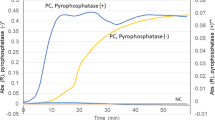Abstract
Using Streptococcus pneumoniae as an example, the ability of multilocus sequence typing (MLST) to characterise isolates directly from cerebrospinal fluid (CSF) was investigated. A nested multiplex polymerase chain reaction method that amplifies the seven housekeeping gene fragments used for pneumococcal MLST was applied to 30 CSF samples from suspected cases of bacterial meningitis. The fragments were amplified from all 14 samples from which Streptococcus pneumoniae was cultured, and, after direct sequencing, the allelic profiles obtained from ten of the samples corresponded to those of clones previously associated with invasive pneumococcal disease. MLST could also predict the penicillin susceptibility and serotype of the CSF isolates.
Similar content being viewed by others
Author information
Authors and Affiliations
Rights and permissions
About this article
Cite this article
Enright, M., Knox, K., Griffiths, D. et al. Molecular Typing of Bacteria Directly from Cerebrospinal Fluid. EJCMID 19, 627–630 (2000). https://doi.org/10.1007/s100960000321
Issue Date:
DOI: https://doi.org/10.1007/s100960000321




